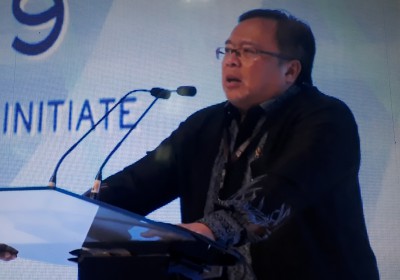IDF 2019: Synergizing to Change the Diploma Mindset for Future Human Resources
July 22, 2019
The Minister of National Development Planning / Head of National Development Planning Agency, Bambang Brodjonegoro.
The Minister of National Development Planning / Head of National Development Planning Agency, Bambang Brodjonegoro, explained that many graduates and prospective workforce are still prioritising their graduation status over competency. According to Minister Bambang, competency is essential to access the future labor market, which has entered the industrial revolution 4.0.
“This has to be changed. It is no longer diploma oriented, but competency oriented. The mindset needs to be shifted from just owning a diploma to having the competency,” said Bambang during the Inspire plenary session on Structural Transformation, in Indonesia Development Forum (IDF) 2019, at the Jakarta Convention Center, July 22, 2019.
Meanwhile, the Minister of Industry, Airlangga Hartarto, said that going forward, work will be based on data, and always linked to the Internet of Things. Therefore, these must be mastered by our human resources in the future, not only by millennials but also post-millennials.
“I call this group 'selenials' (setelah milenial), or post millennials, who can be directed to focus on managerial aspects,” explained Minister Airlangga, and added that sellenials must also adapt themselves in using technology.
According to Deputy II for Priority Area Study and Management of the Presidential Staff Office, Yanuar Nugroho, improving human resources is crucial, not only to face industrial revolution 4.0 but also in light of the demographic bonus in 2030.
“What needs to be underlined is preparing competitive competencies and character, as in having capabilities not only to excel, but also to contribute to the development,” elaborate Yanuar in a Special Session entitled “Skills of the Future: Accelerating Indonesia’s Human Capital Transformation in the Age of New Industrial Revolution”, a session that generated high enthusiasm from participants.
The government’s vision in developing human capital is to ensure that development includes all aspects, and covers all the way from upstream to downstream.
“I can summarise it into three things, first, at the upstream, ensuring basic service delivery. We want to make sure they receive the proper health service, good education service, and social protection,” continued Yanuar.
At the downstream side of the government, according to Yanuar, quality talents need to receive opportunities to be engaged in development.
“And in between, it is all about rearranging policy. We need to ensure that we get the best people and provide them with the best opportunities,” he said.
Therefore, he encouraged the engagement of the private sector and several other parties to improve Indonesia’s human capital, for example in the field of research and development.
“You know, 80 percent of investment (on Research and Development) still comes from the government. We need to drive the private sector to invest more in R&D,” he said.
He stressed that the issue of human capital cannot be solved by the government alone.
“Don’t wait for the government,” exclaimed Yanuar.
In five years, the government has prepared infrastructure as a capital. Going forward, there needs to be participation from multiple parties in preparing human resources.
“Downstream regarding talent management, looking at how excellent talents in several areas are being managed,” continued Yanuar.
Yanuar gave a warning not to let the case of Elias Pical, who was a boxing champion but ended up as a security guard, happens again in the future. Talents in any field must be managed, and this is everyone’s responsibility.
What about the role of the education world? Dean of the Computer Faculty of the University of Indonesia, Mirna Andriani, highlighted the importance of adjusting human resources with the needs of the industry.
“What the university can do, like what has been done by the Computer Faculty of the University of Indonesia, is cooperating with industries to conduct a number of things, one being apprenticeship that accepts people not only domestically, but also from overseas,” she explained.
Another measure is the industry would come to campuses and offer training, using applicative topics which are required by companies. The University of Indonesia, Mirna said, also holds project classes, which are classes to test projects on the industrial world. In this case, mentoring is performed by the industry.
“The problems are given by the industry, and students are asked to resolve these problems for six months,” she added.
At the intermediary level, efforts towards industrial 4.0 are conducted through vocational education. The principal of St Mikael Surakarta Vocational School (SMK), Albertus Murdianto, said, “St Mikael is optimistic to face industrial 4.0 without abandoning our basic education, namely discipline, honesty, responsibility, hard work, and innovation,” he said.
Murdianto conveyed this in the Inspire 2 session, which was themed “Reforming the Vocational Education and Training (TVET) System for Future Jobs”. Still, on the vocational education topic, Toto Purwanto, the Team Leader Agency for International Development, said that currently there are Job Training Providers (Balai Pelatihan Kerja/BLK) that are managed by the Ministry of Manpower.
“Participants in BLK are not limited by their education level. As long as they can read and write, BLK can be used by anyone,” he said.
Industrial era 4.0 is a trend of automation and data exchange in the manufacturing technology, including cyber-physical system, Internet of Things (IoT), cloud computation, and cognitive computation. Everything is moving fast in this era, leaving actors or human resources to offset the advancement with required skills as their capital.
Indonesia’s Research Institutions Supporting the Development of the Electric Vehicle Industry
Indonesian Muslim Fashion and Cosmetics IKMs Shine at Dubai World Expo 2020
Govt Steps Up UMKM Transformation Efforts in the Midst of Pandemic Slowdown
Govt Encourages Promotion of IKM Products in Digital Era
Government Begins Developing Maritime Training Center in Makassar
Tweets by IDDevForum
